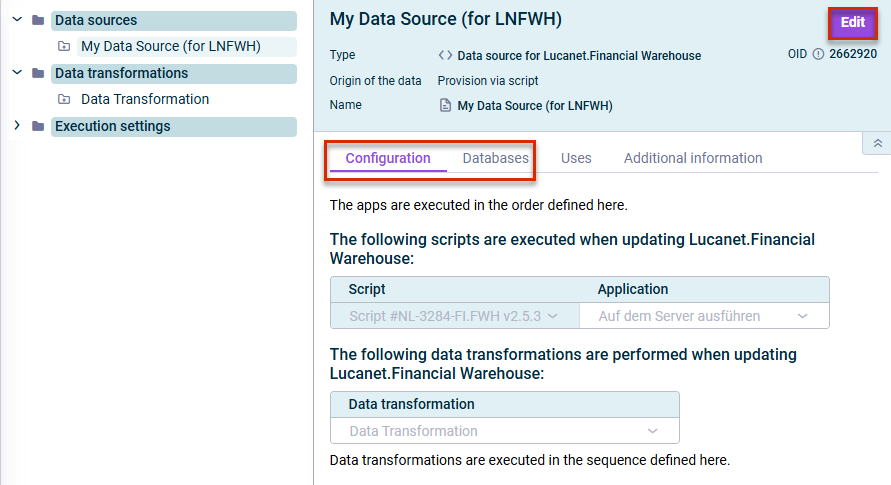Defining a Data Source
Last updated on 2025-11-28
Overview
In the data source, it is indirectly determined from which source system data are to be applied by specifying scripts. This is also where all transformation rules to be applied to the source data and the data for the Lucanet databases (temporary database for imports and Lucanet.Financial Warehouse) are specified.
This article contains the following sections:
Creating a Data Source
To create a data source for importing data into Lucanet.Financial Warehouse:
- Open the Importing data into Lucanet.Financial Warehouse workspace in the Import and Journals folder.
- Right-click Data sources and choose Create | Data source from the context menu in the tree view of the workspace.

Creating a new data source - The Create data source dialog is displayed.
- Specify the name of the data source in the Element name field.
- Click Save or press Enter to create the data source.
- In the detail view of the new data source, click Edit.

Open the editing mode of a data source - Then configure the data source (see Configuring a Data Source).
Configuring a Data Source
'Configuration' Tab
The following options must be specified on the Configuration tab:
Option
Description
Add a script
Script: Scripts that are executed during the import to Lucanet.Financial Warehouse
All scripts from the Scripts workspace are available.
Application
Location where the script is to be executed.
If you have set up and are using SEA, you must choose the created application (see Creating SEA Applications on the CFO Solution Platform) in the Application drop-down list.
SEA (Lucanet Script Execution Application) is a Lucanet application that is required when ERP/financial source systems are operated on-premises and data from these systems needs to be imported into the Lucanet CFO Solution Platform via script.
Add data transformation
Data transformations that are executed during the import to Lucanet.Financial Warehouse. All data transformations from the Data transformation folder are available (see Creating Data Transformations).
'Database' Tab
You must configure one database connection for the temporary Lucanet.Financial Warehouse and one for the persistent Lucanet.Financial Warehouse when importing data into LucaNet.Financial Warehouse.
The following options must be specified on the Database tab for both the temporary and persistent Lucanet.Financial Warehouse:
Option
Description
Database
The desired database system
Database parameters
Configuration of the required database parameters and the access data of the technical user (User and Password)
The parameters to be specified depend on the chosen database.
In the section Configuring Database Connections, you can find a table with the default parameters that must be specified, depending on the selected database.
Test connection
Test whether a connection can be established with the configured database.
Create tables
Used to create all necessary tables in Lucanet.Financial Warehouse and in the temporary database for new imports.
If the tables already exist, they and their content are deleted by this action.
Save
Saves the current settings
'Uses' Tab
The elements that use the data source are displayed on the Uses tab.
You can open the respective element by clicking the link in the Name column.
